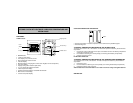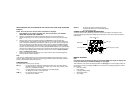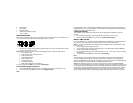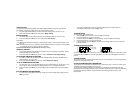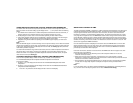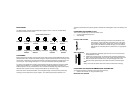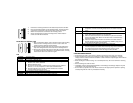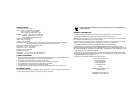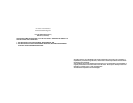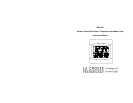433MHz RECEPTION CHECK FOR OUTDOOR TEMPERATURE TRANSMITTER
The atomic clock will receive the temperature data within 4 minutes. If the temperature data is not
being received 4 minutes after setting up (the display shows “- - -”), then please check the following
points:
1. The distance of the atomic clock or outdoor temperature transmitter should be at least 6 feet (2
meters) away from any interfering sources such as computer monitors or TV sets.
2. Avoid placing the receiver onto or in the immediate proximity of metal window frames.
3. Using other electrical products such as headphones or speakers operating on the same signal
frequency (433MHz) may prevent correct signal transmission and reception.
4. Neighbors using electrical devices operating on the 433MHz signal frequency can also cause
interference.
Note:
When the 433 MHz signal is received correctly, do not re-open the battery cover of either the outdoor
temperature transmitter or atomic clock, as the batteries may spring free from the contacts and force
a false reset. Should this happen accidentally then reset all units (see Setting up above) otherwise
transmission problems may occur.
The maximum transmission range is 82 feet (25 meters) from the outdoor temperature transmitter to
the atomic clock (in open space). However, this depends on the surrounding environment and
interference levels. If no reception is possible despite the observation of these factors, all system
units have to be reset (see Setting up).
CHANGING THE DISPLAY MODE (DAY, SECONDS, AND TEMPERATURES)
There are three possible display modes to view the day, seconds, and temperatures.
The month&date/weekday/indoor temperature/outdoor temperature is the default.
To change the display:
1. Press the + key. The display should now show the month&date/weekday/seconds/ indoor
temperature.
2. Press the + key a second time and the display will now show the month&date/seconds/indoor
temperature/outdoor temperature.
3. Press the + key third time and the display will return to the normal display.
WWVB RADIO CONTROLLED TIME
The NIST radio station, WWVB, is located in Ft. Collins, Colorado and transmits the exact time signal
continuously throughout the United States at 60 kHz. The signal can be received up to 2,000 miles
away through the internal antenna in the atomic clock. However, due to the nature of the Earth’s
Ionosphere, reception is very limited during daylight hours. The atomic clock will search for a signal
every night when reception is best. The WWVB radio station derives its signal from the NIST atomic
clock in Boulder, Colorado. A team of atomic physicists continually measures every second of every
day to an accuracy of ten billionths of a second a day. These physicists have created an international
standard, measuring a second as 9,192,631,770 vibrations of a Cesium 133 atom in a vacuum. This
atomic clock regulates the WWVB transmitter.
Once the outdoor temperature is displayed on the atomic clock, the WWVB tower icon in the clock
display will start flashing in the top center of the LCD. This indicates that the clock has detected a
radio signal and is trying to receive it. When the time code is received, the WWVB tower becomes
permanently lit and the time will be displayed.
If the tower icon flashes, but does not set the time or the WWVB tower does not appear at all, then
please take note of the following:
• Recommended distance to any interfering sources like computer monitors or TV sets is a
minimum of 6 feet (2 meters).
• Within ferro-concrete rooms (basements, superstructures), the received signal is naturally
weakened. In extreme cases, please place the unit close to a window and/ or point its front or back
towards the Fort Collins, Colorado, transmitter.
• During nighttime, the atmospheric disturbances are usually less severe and reception is possible
in most cases. A single daily reception is adequate to keep the accuracy deviation below 1
second.
Note:
In case the atomic clock is not able to detect the WWVB-signal (disturbances, transmitting distance,
etc.), the time can be manually set (please refer to notes on Manual time setting)



